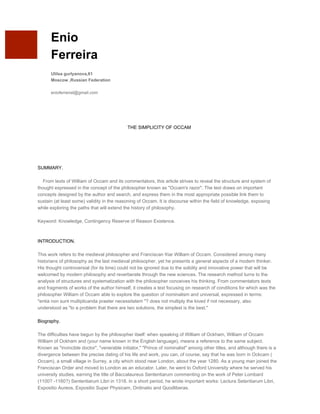
THE SIMPLICITY OF OCCAM
- 1. Enio Ferreira Ulilsa gurlyanova,61 Moscow ,Russian Federation enioferreiral@gmail.com THE SIMPLICITY OF OCCAM SUMMARY. From texts of William of Occam and its commentators, this article strives to reveal the structure and system of thought expressed in the concept of the philosopher known as "Occam's razor". The text draws on important concepts designed by the author and search, and express them in the most appropriate possible link them to sustain (at least some) validity in the reasoning of Occam. It is discourse within the field of knowledge, exposing while exploring the paths that will extend the history of philosophy. Keyword: Knowledge, Contingency Reserve of Reason Existence. INTRODUCTION. This work refers to the medieval philosopher and Franciscan friar William of Occam. Considered among many historians of philosophy as the last medieval philosopher, yet he presents a general aspects of a modern thinker. His thought controversial (for its time) could not be ignored due to the solidity and innovative power that will be welcomed by modern philosophy and reverberate through the new sciences. The research method turns to the analysis of structures and systematization with the philosopher conceives his thinking. From commentators texts and fragments of works of the author himself, it creates a text focusing on research of conditions for which was the philosopher William of Occam able to explore the question of nominalism and universal, expressed in terms: "entia non sunt multiplicanda praeter necessitatem "? does not multiply the loved if not necessary, also understood as "to a problem that there are two solutions, the simplest is the best." Biography. The difficulties have begun by the philosopher itself: when speaking of William of Ockham, William of Occam William of Ockham and (your name known in the English language), means a reference to the same subject. Known as "invincible doctor", "venerable initiator," "Prince of nominalist" among other titles, and although there is a divergence between the precise dating of his life and work, you can, of course, say that he was born in Ockcam ( Occam), a small village in Surrey, a city which stood near London, about the year 1280. As a young man joined the Franciscan Order and moved to London as an educator. Later, he went to Oxford University where he served his university studies, earning the title of Baccalaureus Sententiarum commenting on the work of Peter Lombard (1100? 1160?) Sententiarum Libri in 1318. In a short period, he wrote important works: Lectura Setentiarum Libri, Expositio Aureos, Expositio Super Physicam, Ordinatio and Quodliberas.
